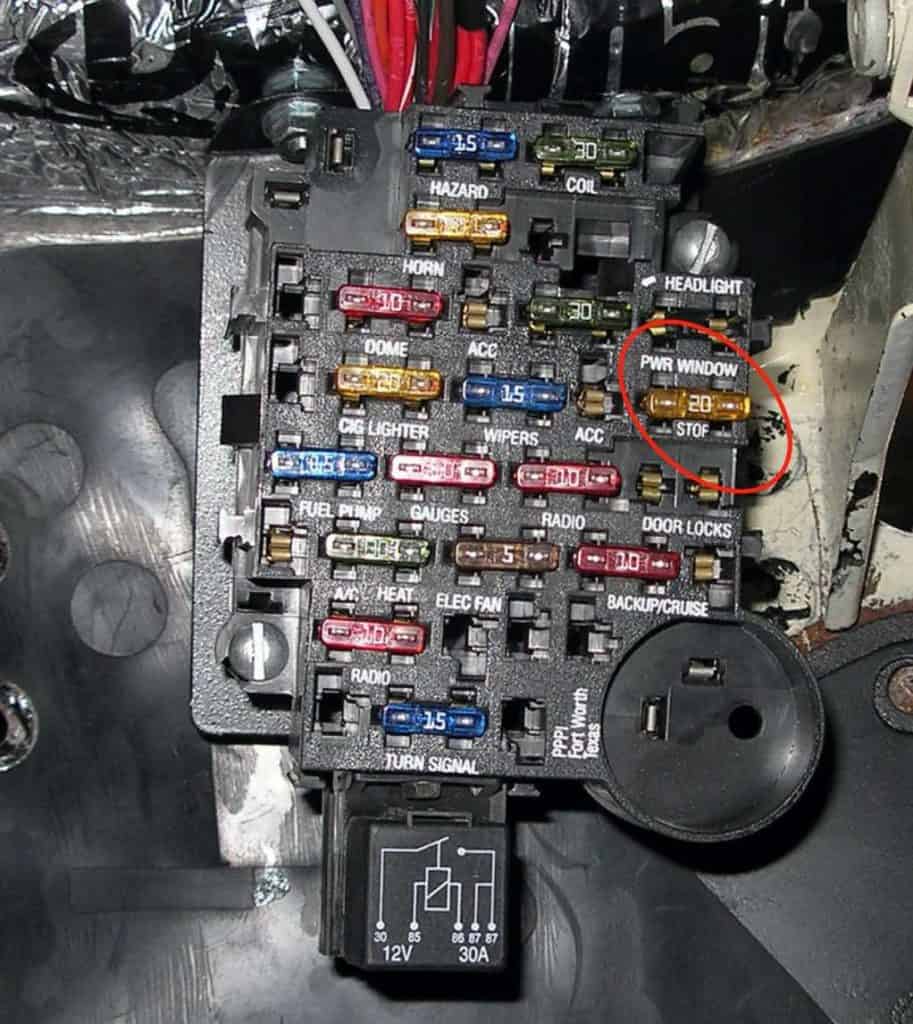Brake lights are one of the most critical safety features that your Hyundai i30 has. They let other drivers know when you are slowing down, and that they need to slow down too. If your brake lights aren’t working, you’re way more likely to get rear ended than normal. The good news is that troubleshooting brake lights that aren’t working isn’t too difficult. The most common cause for this is a bad brake light switch.
You can test whether or not your i30’s brake lights are working all by yourself. Just back up really close to the garage door and push the pedal. You should be able to see the brake lights illuminating the door. If even one of them comes on, you know that the brake light fuse isn’t blown. We’ll go into more depth on that below.
Driving without the brake lights working is just as unsafe as if your i30’s brake lights were stuck on.
1. Check the Fuse
If none of the brake lights are working, we are going to follow the circuit from the fuse box back to the brake pedal. At some point the power is not getting from point A to point B. We just have to find where that is.
Please note that tail lights can work even if the brake lights are burned out. It is entirely possible that all the brake lights burned out at the same time.
The first thing that you should do if all of the brake lights are not working is check the fuse. It’ll be clearly labeled. It usually says something along the lines of “stop lamps” or stop. You can pull it and visually inspect it to make sure that it is not broken.
Even if it looks fine, if you have another fuse of the same amperage, swap it anyway. What works better is using a simple electrical test light to determine if the circuit works. Wal-Mart and any parts store will keep them in stock, usually at $10 or less.
Just hook the clip of the light up to a good ground and touch the two metal tabs on top of the fuse. There is no need to pull the fuse for this. It should be “hot” on both sides. If it is not, replace the fuse. If it blows more than once, it’s likely that your i30’s wiring harness has been damaged on the way to the brake lights. Make sure to put the same size fuse back in
2. Check your i30’s Brake Light Switch
Ok, now we’ve confirmed that there is power going to the brake light circuit, it’s time to figure out where in the path from the fuse box to the brake lights the power is lost. The most common location is the brake light switch. The good news is they are inexpensive and easy to replace.
Your i30’s brake light switch is under the brake pedal. It ALWAYS should have power running to it, even if the key is off. We need definitely need a test light at this point. The video below shows exactly how to do this.
He has the brake light switch out of the vehicle, which makes it way easier to see. You do not need to do this.
Basically, there are two wires, one is alway hot. When you press the brake pedal down, it sends this power to the brake lights. This is the most likely failure point.
If your vehicle has cruise control, it may appear as though there are two brake switches. The other one is to tell the cruise control to turn off when you press the brake pedal. You may need to consult your manual to determine which one is which. But, as a general rule, the cruise control switch will not have power going to it when the key is off like the brake light switch does.
3. Check for a Bad Ground
If there is a ground wire running to the brake light switch, make sure that it is secured tightly and corrosion free. If you can’t find the ground wire at all, run a jumper wire to substitute for the ground wire.
Now test the brake light switch. If it works, fix the ground wire.
4. Other Wiring Issues
If your i30’s brake light switch checked out ok, and there are no brake lights illuminating at all, inspect the wiring harness going from the brake switch to the bulbs themselves. There could be an issue with frayed wiring, wiring that has lost its ground, or a short/open situation.
If you have the “third” or dedicated brake light (the one not in your tail lights), check the harness after they diverge. You know that it has power before this point since the third brake light is still getting power.
Look in the trunk (if applicable). Check any grounds the harness has in there. Make sure that the harness wasn’t damaged in there. It’s not uncommon for cargo to do this.
Conclusion: Hyundai i30 Brake Lights Not Coming On
If your i30’s brake lights are not working, it’s most likely going to be caused by a bad brake light switch. Good luck fixing your vehicle!


